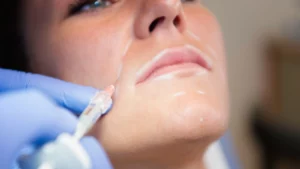When we think of skincare, we tend to think of the latest new products and trends meant to target and treat common skin concerns such as acne or wrinkles. But when it comes to mature skin, there are specific issues that require extra care and work to combat. To take the best care of your skin, you need to embrace aging gracefully and address specific skincare concerns.
Aging is a natural process, and wrinkles, dryness, and age spots are all common occurrences. It’s important to properly hydrate your skin, protect it from the sun, and apply moisturizers. Skincare products should be specifically chosen for their ability to target and minimize the signs of aging.
You should be looking for products that contain ingredients with antioxidant and anti-inflammatory properties. These will help to shield your skin from damaging elements and protect it from further damage. When choosing a moisturizer, look for products that contain hyaluronic acid, which helps to hydrate skin and encourage cell turnover. Products with vitamin C, retinol, and ceramides will all help to further protect and nourish the skin.
A nighttime routine should include products that deeply hydrate the skin while you’re asleep. You want to find an oil-based serum that absorbs deeply. This can help to nourish and revitalize the skin leaving it feeling softer, smoother, and more elastic. If your skin feels particularly dry, you may want to choose a product with an occlusive agent that will trap moisture and further hydrate the skin.
When it comes to exfoliating, you should be using a gentle product to avoid aggravation of the skin. There are products that can help to reduce the appearance of wrinkles, reduce pigmentation, and reveal a brighter complexion. Look for masks and scrubs that contain alpha hydroxy acids and beta hydroxy acids used to exfoliate.
UVA and UVB rays from the sun can be particularly damaging to the skin, so be sure to use products with SPF to protect it. The use of sunscreen helps to minimize discoloration, wrinkles, and other texture issues. At a minimum, aim to use sunscreen with SPF 30 to adequately protect the skin.
Another convenient and effective skincare solution is the use of anti-aging devices. Home skincare devices, such as LED light masks, can help to enhance and accelerate collagen production. These masks can help to restore the texture of your skin and even out pigmentation. This can reduce fine lines and wrinkles associated with aging.
When it comes to aging gracefully, it’s also important to take care of yourself on the inside and outside. Be sure to get enough rest, exercise regularly, and make dietary changes that will reduce inflammation. Managing stress is also an important factor for keeping skin looking youthful and vibrant.
Taking care of your skin doesn’t have to be a daunting task. Making small changes to your skincare routine can help to improve the overall look and texture of mature skin while treating specific concerns. By embracing your age, you can have beautiful, radiant skin. With the right products and care, you can get the results you desire so you can look and feel your best.
What is mature skin in skincare?
Mature skin is generally considered to be skin over the age of 40 and is characterized by fine lines, wrinkles, sagging, and dryness. Mature skin requires special skincare products that are formulated to help replenish lost moisture, boost collagen production, and protect the skin from environmental damage. Products such as moisturizers, serums, and night creams are often used as part of a mature skincare routine.
How do you make a skincare routine for mature skin?
1. Cleanse: Start by cleansing your skin twice a day; choose a gentle cleanser that is suitable for mature skin.
2. Exfoliate: Next, use an exfoliating scrub or a gentle acid toner, like an AHA or BHA, to help remove dead skin cells that can build up on mature skin.
3. Treatment: Apply a hydrating serum or face oil to nourish and treat your skin.
4. Moisturize: Choose an anti-aging moisturizer designed specifically for mature skin, with ingredients like hyaluronic acid and antioxidants to help hydrate, soothe and protect your skin.
5. Sunscreen: Lastly, apply a broad-spectrum sunscreen with at least SPF 30 every morning before leaving the house to protect your skin from sun damage.







